Help
In order to use this Interactive version of the Hastings Borough Council LDF to its fullest potential it is strongly recommended that the user reads this guide before proceeding.
Contents
- Introduction
- Navigating around the map
- Map Key
- Querying the policy data
- Map Printing
- Measuring Distances and Areas on the Map
- Saving the Map
Introduction
The maps can be accessed by clicking on the Maps link on the header bar.
The main site consists of a map on the right hand side and on the left
the following tabs.
Map Location Searching

Overview Map

Map Key

Map Policies

Navigating around the map
The mapping comprises 7 levels of zoom ranging from a simple borough
overview to detailed OS MasterMap data.
The current viewing level is indicated by the zoom level indicator and
along with this the current map viewing scale is also displayed.


Pan/Zoom Control
Use this control to pan around and zoom into more detailed mapping

In order to pan around the mapping -
- Click on the desired compass direction (N, S, E, W) to pan the map in this direction.
- Select the Pan tool
 to be able to pan the map by clicking and dragging the map.
to be able to pan the map by clicking and dragging the map.
In order to zoom in and out of the mapping -
- Click on the Zoom in or Zoom out icons.
- Drag the zoom level indicator zoom to this level of detail.
- Double click on the map to zoom in at the clicked point.
- Select the Zoom tool
 and drag a zoom extent over the map.
and drag a zoom extent over the map. - Key in a desired map scale and pressing the refresh button.
Overview Map
Use this control to quickly navigate to a specific part of the borough. Note the red square indicates the current map view

Click on this image to navigate to this part of the borough, or drag the coverage indicator box to the desired part of the borough
Location Searching
Use this to navigate the mapping to a specified address, street or locality within the borough
- Initially choose the option to that defines your search Postcode
or Street

- Enter the postcode/street name or part of in the box and press go.

(Please enter as much as you know to ensure you can navigate to the desired location)
- The search will return with a list of the first 20 matches from
which the user can click on the link to zoom to that part of the mapping.
An example is shown below.

Or, if an exact match has been found, the mapping will navigate to this location directly.
- To navigate to a specific locality in the borough use the quick
links. This contains a list of major localities in the borough in
which the user can quickly navigate to.

Map Key
The key control provides functionality to control what policies are visible over the base mapping. Each individual layer control doubles as a key to indicate how this policy layer is displayed on the map.

- To turn all layers on click on the All Layers On link.
- To turn all layers off click on the All Layers Off link.
- To turn an individual layer on/off click on the check box next to the layer.
- To turn a group of layers on/off click on the check box next to the layer group heading.
- To expand/collaspe a layer group click on the "+" and "-" symbols. Clicking the symbol while holding down the shift key will expand/collaspe all layer groups.
- To zoom the map to the full extent of all features in a layer click on the text description of the layer
Please note that the interactive map allows policy boundary information to be displayed above the native scale at which they are shown on the source mapping.
Querying the policy data
The site is able to query the map and return a list of policies associated
with that query, as shown below.

By clicking on each individual policy link, the user is able to view
text information from the Written Statement pertaining to this policy.
Note, that only the policies that are visible on the map will be
used in the queries. So for a comprehensive query ensure all the policy
layes are visible.
Click on the Print button  to open the list of captured policies in a new window ready for printing.
to open the list of captured policies in a new window ready for printing.
Click on the Export button  to save the list of captured policies as a CSV file.
to save the list of captured policies as a CSV file.
The map data can be queried by any of the following methods -
- Select the info button on the toolbar

- Click on the map and a list of all policies associated with this point location will be displayed under the Policies tab on the left.
- Use the Next and Previous links at the bottom to move between the results pages if necessary.
- Click on the link to view the Written Statement text for this policy
- Click on one of the following buttons on the toolbar -
Capture by Line Capture by Radius
Capture by Radius  Capture by Shape
Capture by Shape  Capture by Extent
Capture by Extent 
- Draw the shape over the map -
- To draw a polygon or line click on the map to define each shape vertex. To complete drawing double click.
- To define an radius or extent click and hold down the mouse on the map, then drag out to draw the radius or extent. Release the mouse button to finish drawing.
An example of capturing policies by a radius is shown below.
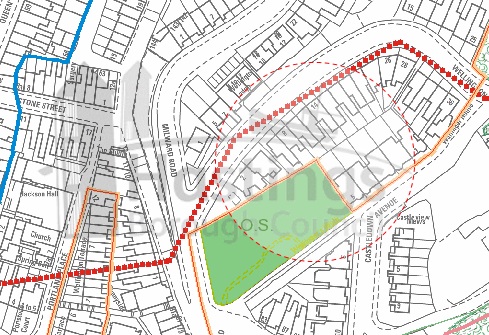
- When the shape has been drawn a list of all policies that intersect with this shape will be displayed under the Policies tab on the left.
- Use the Next and Previous links at the bottom to move between the results pages if necessary.
- Click on the link to view the Written Statement text for this policy.
- When using these capture policy tools the capture shape will remain
over the mapping until another query is performed. To delete click
on the shape and choose the Delete Shape option, as shown
below.
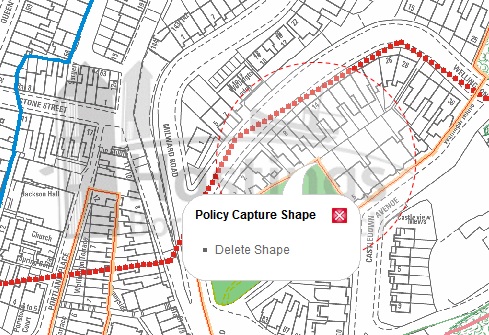
- Click on the visible in the current view link to list all
the policies that are visible in the current map view.

- Click on the required link to view the Written Statement text for this policy
Once the user moves away from the current view, by either panning or zooming the map, the list of policy results will be cleared ready for the next query.
Map Printing
The site provides fuctionality for the user to print the map along
with a map legend and specific user information.
To print the map -
- Select the print button on the toolbar
 This will open the print layout page in a new window, as shown below.
This will open the print layout page in a new window, as shown below.
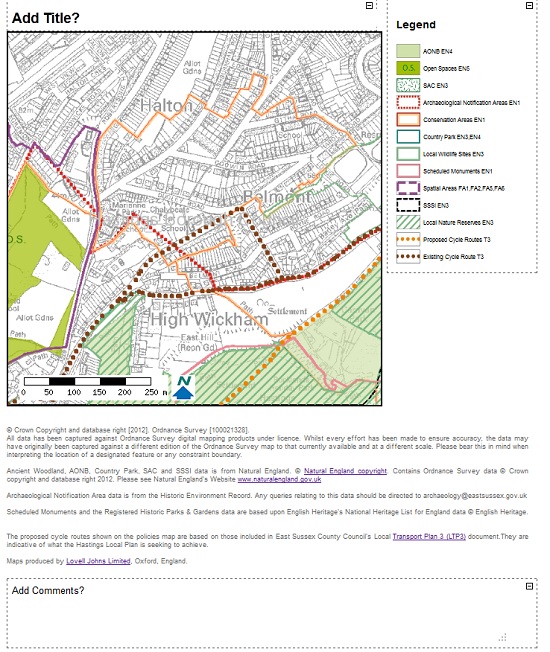
This layout includes-
- Current map view
- Input for the user to add a custom title
- Input for the user to add custom comments
- Map legend containing all policies visible on the map
- To add a custom title, replace "Add Title?" with the required
text.

If a title is not required this element can be hidden by clicking the hide button in the top right.
- To add a custom comments, replace "Add Comments?" with
the required text.

If no comments are necessary this element can be hidden by clicking the hide button in the top right.
- If the map legend is not required on the print it may be hidden
by clicking the hide button in the top right
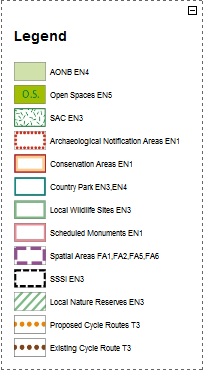
- When the layout is finalized the page can be printed in the normal manner
Measuring Distances and Areas on the Map
- To measure a distance, click on the Measure Distances tool

Mark out the line over the map by clicking once to add a vertex and double clicking to complete the line.
The distance will display in the top right corner of the map.
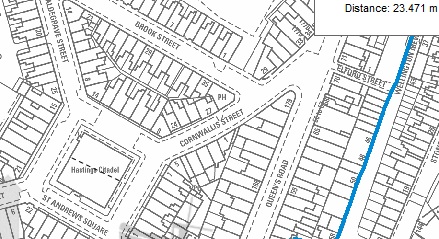
- To measure an area, click on the Measure Areas tool

Mark out the polygon shape over the map by clicking once to add a vertex and double clicking to complete the shape.
The area will display in the top right corner of the map.
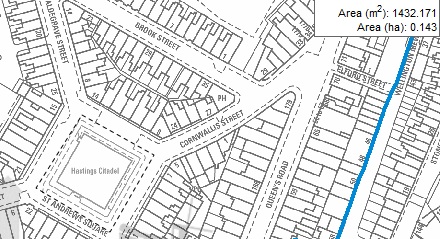
Saving the Map
To save the map in JPEG format, click the Save Map  button.
button.
The user will be prompted to either open the file or save it. Choose
Save and define the location on the local machine to download
it to.